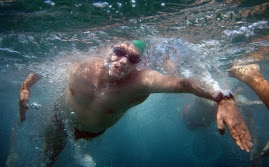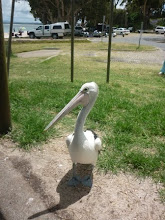I picked up a postcard that advertised an exhibition at the National Maritime Museum called Planet Shark - Predator or Prey. It's on until the February 27, 2011.
As an ocean swimmer, I find sharks fascinating and terrifying. I don't think about them every time I enter the open water, but when I get separated from the peloton (I told you I was slow and lacked a sense of direction) my imagination goes into overdrive as I consider the sonar signals my kicking size-7 feet might send out to a horde of ravenous carnivores.
Bruce the vegetarian shark does not exist. Sharks eat meat using their multiple rows of monstrous dagger-shaped teeth to tear into human flesh as the victim thrashes in a sea of her own blood while her limbs are severed - one by one. And so on and so forth. Blah blah blah.
But because I'm a rational person, I know my chances of being attacked by a shark are miniscule. On http://www.funny2.com/, there's a list of odds, which claims the chance of dying from a shark attack is 1 in 300,000,000.
This American website says 1 in 3 people will die from heart disease (go easy on the plum pudding and custard on Christmas Day) and there's a 1 in 18,585 chance of carking it in a car accident. And to really get you in a festive mood, the chance of dying from any kind of injury during the next year is 1 in 1820.
Sharks are seriously dangerous and I'm not gonna dangle my tootsies off most of the coast of South Australia or WA, but I'm also not getting my knickers in a knot when all the ocean swimming events I enter put swimmer safety first.
Here's what Time Out magazine says of the Maritime Museum exhibition:
Explore the murky myths and fascinating facts which have surrounded one of the most misunderstood animals on earth for centuries. Journey through Planet Shark and see full-scale specimen models, fossils, real teeth and jaws, original items from the 1975 movie Jaws and interviews with shark attack survivors. Gain a new level of respect and understanding for the oceans oldest predator.
Survivors of shark attacks often become sharks' greatest advocates. Navy diver Paul de Gelder, who lost his right hand and lower leg when he was attacked by a bull shark in Sydney Harbour in 2009, now lobbies the UN for stronger international trade regulations to protect sharks.
In an interview in September, de Gelder said: "Do we have the right to drive any animal to the brink of extinction before any action is taken? Regardless of what an animal does according to its base instincts of survival, it has its place in our world. We have an obligation to protect and maintain the natural balance of our delicate ecosystems."
Subscribe to:
Post Comments (Atom)





3 comments:
yesterday's sun herald had a fishing column talking about how many sharks are in the harbour at present
Sharks (being top predators) are a sign of a healthy ecosystem.
Can't swim with them, but I'd hate to swim in an ocean without them.
Apparently, there was a story in the weekend Australian, which explains a theory that sharks choose their victims - it's not just a random thing and they don't go for the meatiest!
I'll check the sun herald. Miss Hissy is out on the harbour today, and with these winds I'm sure she'd capsized a couple of times.
Post a Comment